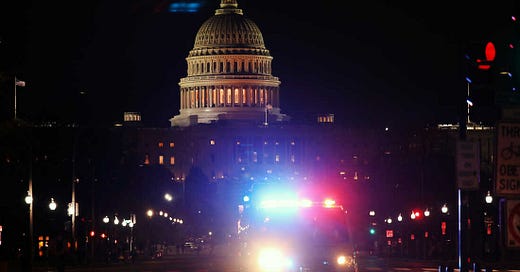"We Can Do Better As an Industry": Osita Nwanevu on US Political Media
"It's just sort of taken as a given that this is the way things are and have to be"
Last week, I spoke to writer Osita Nwanevu about the state of American politics and the media industry that covers it in a far ranging, one hour conversation on my podcast.
During the chat—which you can find here—we discussed the way that US political media and institutions conceive of and present Americans as fundamentally more conservative than they are. That leads to a self-fulfilling prophecy of governing and how the country is covered, which in turn gave the US right-wing ideological minority the sense that the 2020 election was somehow “stolen.”
Nwanevu wrote about this phenomenon in an opinion piece on 1/6 and political violence he wrote for the New York Times last week:
With these structural advantages in place, it’s not especially difficult to see how the right came to view dramatic political losses, when they do occur, as suspect. If the basic mechanics of the federal system were as fair and balanced as we’re taught they are, the extent and duration of conservative power would reflect the legitimate preferences of most Americans. Democratic victories, by contrast, now seem to the right like underhanded usurpations of the will of the majority — in President Biden’s case, by fraud and foreign voters, and in Barack Obama’s, by a candidate who was himself a foreign imposition on the true American people.
Thank you for your support. Please consider a paid annual subscription today.
“Nobody ever questions whether or not that's just or fair”
I asked Nwanevu about how the perception of a dominant right-wing ideological bent in the US affects our politics and media. Here’s that section of our conversation.
Eoin Higgins: One of the more interesting things about the American political machine is the way that it frames its own existence. I'm reminded of this 2013 University of Berkeley paper—I realize that's eight years ago— it showed that lawmakers from both parties thought that their constituents were several percentage points more conservative than they actually were.
I wonder how much that has to do with is this kind of a self perpetuating cycle where it is partly this idea that if America wasn't a conservative country you wouldn't have conservative governance. As long as you don't really look at that in any more detail, that makes sense. Do you think that it's something more than that? At what point is it systemic and at what point is it an intentional move by people on the right to frame things this way?
Osita Nwanevu: I think it's a little bit of both. There's certainly, amongst conservative leaders, a level of self awareness about this and the design of our institutions that might not be there for the “average Joe” voter.
I really do think that there are a lot of conservatives who just think that most of America is conservative and think the only people who are into moderate liberal or left wing politics are people who are cloistered on the coast—that there's this vast country in between them that represents the real country and that's where the bulk of everybody who matters actually lives. I think there are people who are going to the voting booth with that mentality.
That's not just fostered by conservative elites doing political propaganda, or active propaganda, for their side—it's something that you also find reflected in coverage of politics by the mainstream media.
What do we do before and after every election? We go out to the middle of the country, we find this diner and a moderate or conservative seemingly white person. We ask them what they think about American politics and this or that candidate and this or that policy proposal, and that's the voice of the country. That's what every candidate has to appeal to and tailor their message to.
Obviously it's a political reality given the design of the system that voters in these kinds of places matter more than other kinds of voters. But I think the point I'm making is that nobody ever questions whether or not that's just or fair.
It's just sort of taken as a given that this is the way things are and have to be that there are people who really matter in American politics. And it makes all the sense in the world that nobody would go to an apartment complex in New York City or Los Angeles or where I live in Baltimore to ask them what they think about American politics or federal elections and what policies they need.
Nobody in the political media ever asks that question, ever. It's partially the product of our institutions, but I think we can do better as an industry if we really care about political journalism as not just as a sort of reflection of the horse race and competitive aspects of politics, but as something that can illuminate and interrogate basic political structures and tell people more about how the system doesn't work. I think we have a responsibility to question and to test the premises that underpin the system that we take for granted.
I urge you to check out the full conversation.


Also, I talked with Toronto-based writer Karen Geier about psychedelics yesterday. You can find that conversation here.

Thanks for reading—stay tuned for more school and Covid reporting coming soon.
If you liked this story, please consider a paid subscription.
Find me on Twitter and Facebook.
Email me tips at eoinhiggins@gmail.com.




